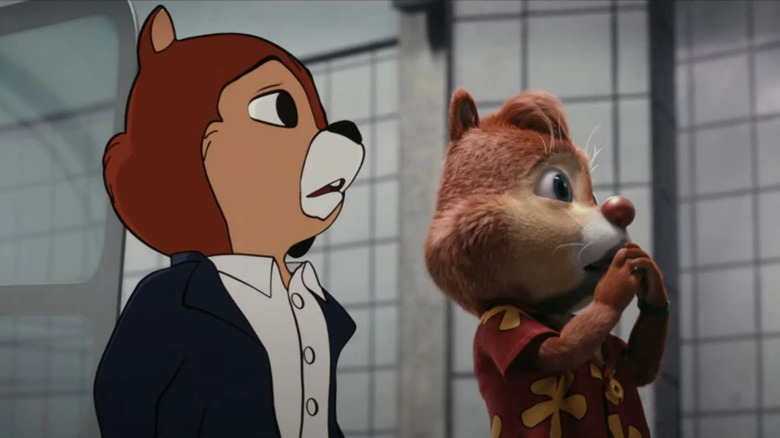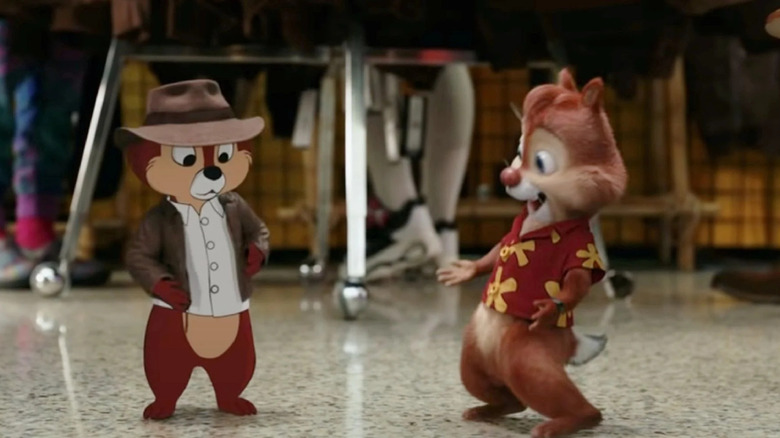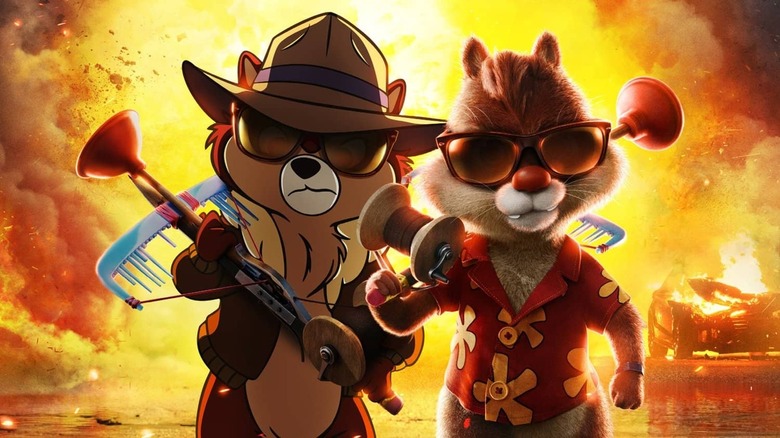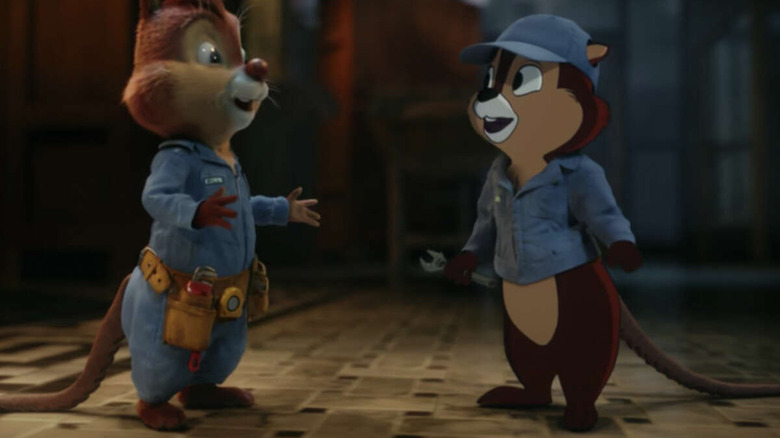Chip 'N Dale: Rescue Rangers Is Like Shane Black Remaking Roger Rabbit
Children of the 1990s will likely dig Akiva Schaffer's new feature film "Chip 'n Dale: Rescue Rangers" for reasons beyond the shock nostalgia. While "Rangers" does indeed lay on the pop culture and animation references thickly and heavily — a keen-eyed Millennial will recognize characters from Eek the Cat to MC Skat Kat — its most comforting aspect is its light, flip tone, and central character conceit straight out of a '90s Shane Black movie.
The premise of "Rescue Rangers" is that Chip (John Mullaney) and Dale (Andy Samberg) were, in fact, actors in a world where animated characters co-exist with live-action humans, a premise borrowed from Robert Zemeckis' 1988 hit "Who Framed Roger Rabbit?" Indeed, Roger Rabbit makes a cameo in the film. As young men, Chip and Dale starred as versions of themselves in the eponymous 1989 Disney Afternoon TV show, only to fall out once the show was canceled. Chip settled into life as an insurance agent, and Dale clung to fame riding the convention circuit signing autographs next to other has-been animated stars. When their old co-star Monterey Jack (Eric Bana) is kidnapped, the two actors have to play the part of Rescue Rangers for real.
The "Rangers" screenplay is credited to Dan Gregor and Doug Mand, but they are borrowing heavily from Black's screenplay for "Last Action Hero," another film where the lines between reality and cinema are effectively blurred. Gregor and Mand have also borrowed from Black's tendency to occasionally pair ill-equipped, showbiz-adjacent characters and have them conduct an investigation. This was the case in Black's excellent "Kiss Kiss, Bang Bang" and his porn-soaked cop drama "The Nice Guys."
Animation as showbiz
The metaphysical commentary of "Chip 'n Dale: Rescue Rangers" is twofold. The '89 TV series was, in a way, a reinvention in itself. "Rescue Rangers" was the second in a wave of shows featuring known Disney characters being handily repurposed from their decades-before comedy roots into new genres. "Rangers" took Chip 'n Dale, previously a mere nuisance for Donald Duck, and transformed them into freelance rodent adventurers who have to traverse the human world stopping anthropomorphic animal miscreants from committing malfeasance. Following "Rangers" was "Darkwing Duck," a superhero spoof set in the "DuckTales" universe, "TaleSpin," a bonkers animated remake of the 1939 film "Only Angels Have Wings," but starring animal characters from the 1967 version of "The Jungle Book" (???), and "Goof Troop," a sitcom wherein Goofy is now a dippy suburban father to a hip-taking pre-teen Goofy child.
Schaffer's new film takes that early '90s repurposing of Disney characters and re-establishes it as the baseline for the characters; Chip 'n Dale never make references to anything the characters appeared in prior to their "Rescue Rangers" TV show (they joke that they had background parts in sitcoms like "Saved by the Bell").
Adding layers of metaphysical, self-aware reflection into a crime comedy film is most certainly a trick Black played in his screenplays. In John McTiernan's 1993 film "Last Action Hero," a young movie buff, thanks to a magical ticket, is transported into an action film starring Arnold Schwarzenegger wherein the clichés and silly plot conceits of cinema are merely reality. Guns always make cars explode, the lead character always has a bad guy hiding in his closet, and every cop is paired with an unconventional partner (there is even an animated cat cop in this world).
Kiss Kiss, Bang Bang
Shane Black often returns to themes of real-world crime vs. the way it's depicted in fiction. This was certainly the case in "Last Action Hero," wherein the Schwarzenegger character would eventually infiltrate the real world and find that the laws of physics are different here. But this was also the central conceit of 2005's "Kiss Kiss, Bang Bang," Black's directorial debut and possibly his best film.
In it, Robert Downey, Jr. plays a low-rent cat burglar on the cusp of burning out. While fleeing from the cops, he stumbles — entirely by chance — into a Hollywood audition. When he breaks down for real in front of the casting agents, he is hired as an actor and paired with a real-life detective (Val Kilmer) who will teach him the tricks of the trade. They kind of hate each other, and Downey's character only knows about detection from his favorite pulp detective novels, and only knows about crime from his own career as a petty hood. He — and the audience — have to look at the plot of the movie simultaneously as a crime to be taken seriously and as a fiction that will have a handily wrapped-up conclusion. Acting is not exactly the most practical skill when it comes to dealing with murder and actual danger, and it seems Black enjoys that fact.
Shaffer, Gregor, and Mand listened closely to Black on "Kiss Kiss, Bang Bang" once again borrowing the premise that actors — even animated ones — will not be able to view criminal bootlegging rings through any other experience than that of performers.
The Nice Chipmunks
Black's 2016 film "The Nice Guys" gives "Rescue Rangers" more character cues than plot conceits. In "Nice Guys," Ryan Gosling plays a down-on-his-luck private detective in 1977 who is decidedly not good at his job and who is barely managing to look after his 15-year-old daughter (Angourie Rice). Gosling has to team up with a thug-for-hire played by Russell Crowe who breaks Gosling's arm early in the film. The two of them delve into the wild world of the 1970s L.A. adult film scene, ill-equipped, at the end of their tethers, and ultimately stumbling their way to the mystery's solution.
Not to spoil anything, but the bumbling nature of "The Nice Guys" is nicely reflected in a climactic scene in "Rescue Rangers" where Dale, watching an old episode of his show for a clue, makes the most circuitous connections imaginable to discern where certain kidnapped characters may be hidden and what the film's villain may be up to. While Dale might have come to the correct conclusions, it is by sheer dumb luck that he managed to discern them. Both films feature a lot of dumb luck leading to lucky locations.
Both in Shane Black films and in "Chip 'n Dale: Rescue Rangers" will the artificiality of film be something to fight through in order to find skill and efficiency. In that regard, all of the films mentioned are rather clever.



